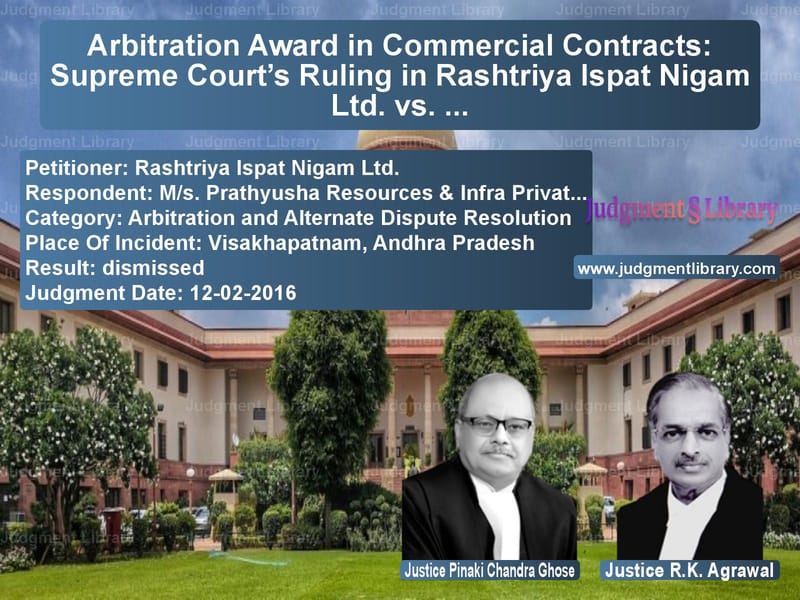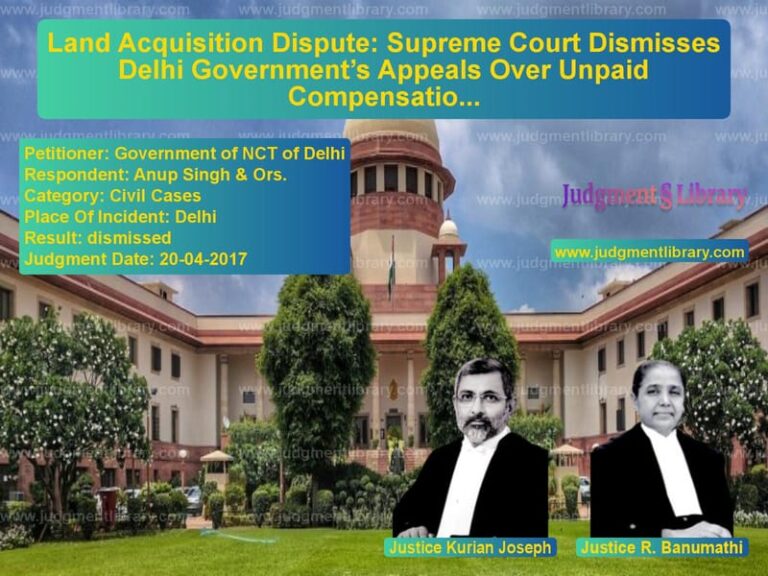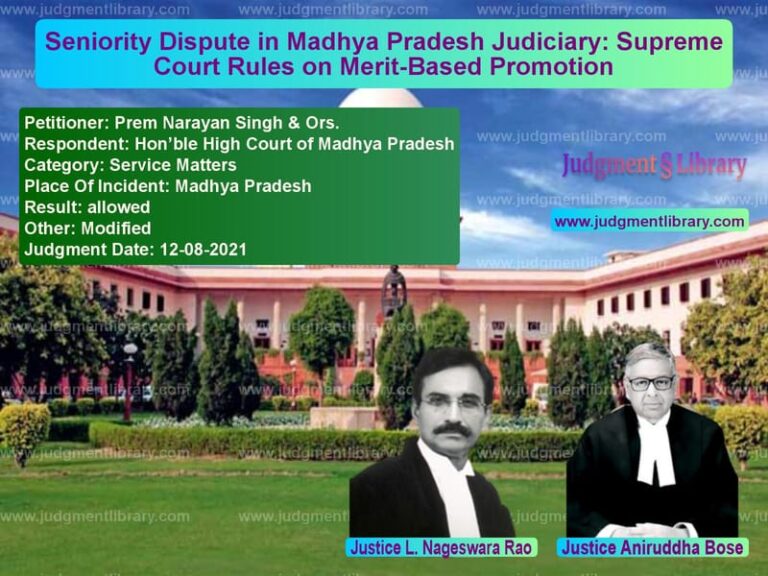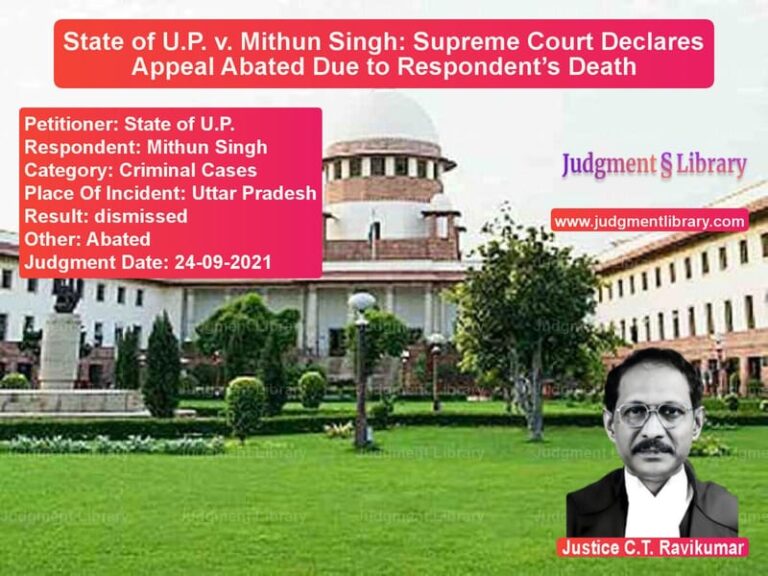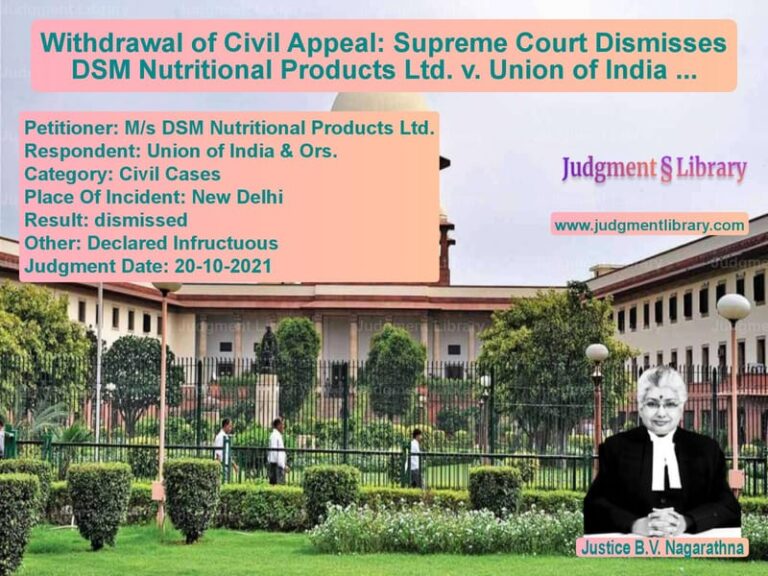Arbitration Award in Commercial Contracts: Supreme Court’s Ruling in Rashtriya Ispat Nigam Ltd. vs. Prathyusha Resources
The case of Rashtriya Ispat Nigam Ltd. vs. M/s. Prathyusha Resources & Infra Private Limited revolves around a significant arbitration dispute concerning a transportation contract and escalation rates. The Supreme Court examined whether the claim for escalation was time-barred and whether the arbitration award in favor of the respondent was legally sustainable.
Background of the Case
The appellant, Rashtriya Ispat Nigam Ltd. (RINL), also known as Visakhapatnam Steel Plant, is a Government of India enterprise engaged in steel production and distribution. The respondent, M/s. Prathyusha Resources & Infra Private Limited, is a transportation and logistics company that provided services to RINL under a contractual agreement.
In March 1992, RINL invited bids for the transportation of pig iron and related materials from its steel plant to the Visakhapatnam Port. The contract was awarded to the respondent on July 28, 1992. The agreement, initially set to expire on March 31, 1993, was extended multiple times until October 23, 1997 due to operational needs.
Dispute Over Escalation Rates
The dispute arose when differences emerged regarding the base year for calculating escalation under the contract. The respondent contended that the base year should be 1992, while the appellant argued that the correct base year should be 1994. The dispute had a substantial financial impact, as it determined the payable rates for the transportation services.
The respondent submitted a final bill containing three annexures:
- The first two annexures were admitted by RINL.
- The third annexure, which dealt with the escalation rate calculation based on the 1992 base year, was rejected.
Following RINL’s rejection of the escalation claim, the respondent invoked arbitration as per the dispute resolution clause in the agreement.
Arbitration Proceedings
An arbitration tribunal, chaired by a retired High Court judge, adjudicated the dispute. The tribunal framed five key issues for determination:
- Whether the claim for escalation was barred by limitation.
- Whether the base year for escalation should be 1992 or 1994.
- Whether the calculations provided by the respondent were valid.
- Whether RINL had wrongfully withheld payments.
- Whether the arbitration award should be enforced.
The tribunal ruled in favor of the respondent and held:
- The base year for escalation was correctly determined as 1992.
- The claim was not time-barred since the dispute crystallized only in 1998.
- RINL was liable to pay the respondent based on the 1992 base year calculations.
Challenge Before the District Court
RINL challenged the arbitration award under Section 34 of the Arbitration and Conciliation Act, 1996. The District Court ruled in favor of RINL, setting aside the award on the following grounds:
- The claim for escalation was barred by limitation under Article 18 of the Limitation Act.
- The right to claim escalation arose when the contract ended on October 23, 1997, and the arbitration was invoked beyond the limitation period.
- The arbitration tribunal had erred in allowing the claim despite being time-barred.
Appeal Before the High Court
The respondent challenged the District Court’s decision under Section 37 of the Arbitration Act. The Andhra Pradesh High Court:
- Overturned the District Court’s ruling.
- Held that the cause of action arose only when the respondent formally demanded escalation in 1998.
- Ruled that the arbitration award was valid and enforceable.
Supreme Court’s Analysis
1. Applicability of the Limitation Act
The appellant argued that the claim was time-barred. The Supreme Court examined the Limitation Act, 1963 and held:
- The right to sue accrues when a real dispute arises, not merely when the contract ends.
- The dispute over escalation became evident in 1998, when the respondent formally requested payment.
- As per Article 137 of the Limitation Act, the claim was within the permissible period.
2. Validity of the Arbitration Award
The Supreme Court emphasized that courts have a limited scope of interference in arbitration awards under Section 34 of the Arbitration Act. It ruled:
- The arbitrator correctly determined the base year for escalation.
- The tribunal’s decision was based on contractual interpretation, and courts should not interfere unless there is a patent illegality.
- The High Court rightly upheld the arbitration award.
3. Final Settlement of Bills
The Supreme Court analyzed:
- The respondent had explicitly reserved its right to claim escalation while the contract was ongoing.
- Correspondence between the parties continued until 1998, indicating that the claim was not abandoned.
- Thus, the arbitration claim was within limitation.
Final Judgment
The Supreme Court dismissed the appeal and ruled:
- The arbitration award was valid and binding.
- The claim was within the limitation period.
- The High Court was correct in upholding the award.
Impact of the Judgment
This ruling reinforces key legal principles:
- Arbitration awards should be final and binding, with limited court interference.
- The Limitation Act must be interpreted considering the actual dispute’s accrual.
- Commercial contracts must be honored, and disputes should be resolved per agreed mechanisms.
Conclusion
The Supreme Court’s decision in Rashtriya Ispat Nigam Ltd. vs. Prathyusha Resources underscores the importance of arbitration in commercial disputes. By upholding the award, the Court reinforced that contractual commitments and dispute resolution mechanisms must be respected. This ruling ensures that arbitration remains an effective and legally binding tool for resolving business disputes.
Don’t miss out on the full details! Download the complete judgment in PDF format below and gain valuable insights instantly!
Download Judgment: Rashtriya Ispat Niga vs Ms. Prathyusha Reso Supreme Court of India Judgment Dated 12-02-2016-1741852620491.pdf
Direct Downlaod Judgment: Direct downlaod this Judgment
See all petitions in Arbitration Awards
See all petitions in Enforcement of Awards
See all petitions in Commercial Arbitration
See all petitions in Judgment by Pinaki Chandra Ghose
See all petitions in Judgment by R K Agrawal
See all petitions in dismissed
See all petitions in supreme court of India judgments February 2016
See all petitions in 2016 judgments
See all posts in Arbitration and Alternate Dispute Resolution Category
See all allowed petitions in Arbitration and Alternate Dispute Resolution Category
See all Dismissed petitions in Arbitration and Alternate Dispute Resolution Category
See all partially allowed petitions in Arbitration and Alternate Dispute Resolution Category

